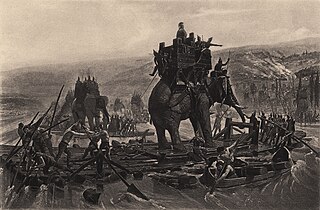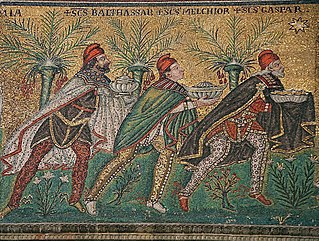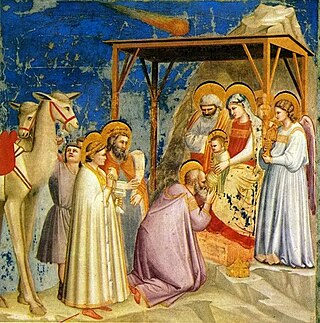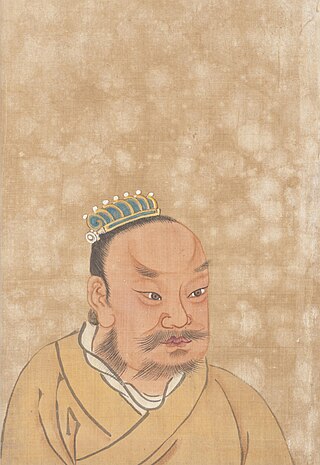Three Kings refers to the Biblical Magi, also known as the Three Wise Men, appearing in the Gospel of Matthew.
Contents
Three Kings may also refer to:
Three Kings refers to the Biblical Magi, also known as the Three Wise Men, appearing in the Gospel of Matthew.
Three Kings may also refer to:
These are lists of incumbents, including heads of states or of subnational entities.

The 3rd century BC started the first day of 300 BC and ended the last day of 201 BC. It is considered part of the Classical Era, epoch, or historical period.
Kings or King's may refer to:

Christmas music comprises a variety of genres of music regularly performed or heard around the Christmas season. Music associated with Christmas may be purely instrumental, or, in the case of carols, may employ lyrics about the nativity of Jesus Christ, traditions such as gift-giving and merrymaking, cultural figures such as Santa Claus, or other topics. Many songs simply have a winter or seasonal theme, or have been adopted into the canon for other reasons.

YuYu Hakusho is a Japanese manga series written and illustrated by Yoshihiro Togashi. It tells the story of Yusuke Urameshi, a teenage delinquent who is struck and killed by a car while attempting to save a child's life. After a number of tests presented to him by Koenma, the son of the ruler of the afterlife, Yusuke is revived and appointed the title of "Underworld Detective". With this title he must investigate various cases involving demons and apparitions in the Human World, with the manga gradually becoming more focused on martial arts battles and tournaments as it progresses. Togashi began creating YuYu Hakusho around November 1990, basing the series on his interests in the occult and horror films and an influence of Buddhist mythology.

The Warring States period was an era in ancient Chinese history characterized by warfare, bureaucratic and military reform, and political consolidation. It followed the Spring and Autumn period and concluded with the wars of conquest that saw the state of Qin annex all the other contender states by 221 BC and found the Qin dynasty, the first imperial dynasty in Chinese history.

In Christianity, the Biblical Magi, also known as the Three Wise Men, Three Kings, and Three Magi, are distinguished foreigners who visit Jesus after his birth, bearing gifts of gold, frankincense, and myrrh in homage to his birth. As such, the Magi are commemorated on the feast day of Epiphany—sometimes called "Three Kings Day"—and commonly appear in the nativity celebrations of Christmas.

"Good King Wenceslas" is a Christmas carol that tells a story of a Bohemian king who goes on a journey, braving harsh winter weather, to give alms to a poor peasant on the Feast of Stephen. During the journey, his page is about to give up the struggle against the cold weather, but is enabled to continue by following the king's footprints, step for step, through the deep snow. The legend is based on the life of the Saint Wenceslaus I, Duke of Bohemia (907–935), who was not a king in his lifetime but had that status conferred on him after his death.
Jin may refer to:

The Star of Bethlehem, or Christmas Star, appears in the nativity story of the Gospel of Matthew chapter 2 where "wise men from the East" (Magi) are inspired by the star to travel to Jerusalem. There, they meet King Herod of Judea, and ask him:
Where is He who has been born King of the Jews? For we have seen His star in the East and have come to worship Him.

Xiang Ji, courtesy name Yu, was the Hegemon-King of Western Chu during the Chu–Han Contention period of China. A noble of the state of Chu, Xiang Yu rebelled against the Qin dynasty, destroying their last remnants and becoming a powerful warlord. He was granted the title of "Duke of Lu" (魯公) by King Huai II of the restoring Chu state in 208 BC. The following year, he led the Chu forces to victory at the Battle of Julu against the Qin armies led by Zhang Han. After the fall of Qin, Xiang Yu was enthroned as the "Hegemon-King of Western Chu" (西楚霸王) and ruled a vast area covering modern-day central and eastern China, with Pengcheng as his capital. He engaged Liu Bang, the founding emperor of the Han dynasty, in a long struggle for power, known as the Chu–Han Contention, which concluded with his eventual defeat at the Battle of Gaixia and his suicide. Xiang Yu is depicted in the Wu Shuang Pu by Jin Guliang.

"We Three Kings", original title "Three Kings of Orient", also known as "We Three Kings of Orient Are" or "The Quest of the Magi", is a Christmas carol that was written by John Henry Hopkins Jr. in 1857. At the time of composing the carol, Hopkins served as the rector of Christ Episcopal Church in Williamsport, Pennsylvania, and he wrote the carol for a Christmas pageant in New York City. It was the first widely popular Christmas carol written in America.

"The Little Drummer Boy" is a popular Christmas song written by American composer Katherine Kennicott Davis in 1941. First recorded in 1951 by the Austrian Trapp Family, the song was further popularized by a 1958 recording by the Harry Simeone Chorale; the Simeone version was re-released successfully for several years, and the song has been recorded many times since. In the lyrics, the singer relates how, as a poor young boy, he was summoned by the Magi to the Nativity of Jesus. Without a gift for the Infant, the little drummer boy played his drum with approval from Jesus's mother, Mary, recalling, "I played my best for him" and "He smiled at me". Despite the song's popularity, the story of the drummer boy is not biblically accurate.
Wang Film Productions Co., Ltd. is one of the oldest and most prolific Taiwanese-American animation studios since 1978. The company, based in Xindian, Taipei and Los Angeles, California, has done traditional hand-drawn 2D animation/ink and paint for various TV shows and films for studios across North America, Europe and Asia-Pacific.
Emperor Yi of Chu, also known as King Huai II of Chu before receiving his de jure emperor title, personal name Xiong Xin, was the ruler of the revived Chu state in the late Qin dynasty. He was a grandson of King Huai of Chu. In 223 BC, during the Warring States period, the Chu state was conquered by the Qin state, which unified the various Chinese feudal states in a series of wars and established the Qin dynasty in 221 BC. In 209 BC, when rebellions broke out throughout China to overthrow the Qin dynasty, the Chu state was revived as an insurgent state against Qin imperial rule. Xiong Xin was discovered by Xiang Liang, a rebel leader who descended from a famous Chu general, Xiang Yan, and installed on the Chu throne as "King Huai II of Chu". However, Xiong Xin was a puppet ruler because power was concentrated in Xiang Liang's hands, and while he was able to assert his power after Xiang Liang was killed in battle, eventually Xiang Liang's nephew, Xiang Yu, would concentrate power in his own hands through a coup against King Huai II's general Song Yi during the Battle of Julu. In 206 BC, the Qin dynasty was overthrown by the rebels, after which Xiang Yu, who was the de facto leader of all the rebel forces, divided the former Qin Empire into the Eighteen Kingdoms. He promoted King Huai II to a more "honourable" title – Emperor Yi of Chu – and made him the nominal sovereign ruler over all the Eighteen Kingdoms. Xiang Yu then had Emperor Yi relocated to Chen County and secretly ordered Ying Bu to assassinate the emperor during the journey.
King of Kings is a lofty title applied to monarchs or deities.
Meredith Rae Mauldin, known professionally by her stage name Meredith McCoy, is an American actress and singer best known as the English voice of Android #18 in the Japanese anime Dragon Ball series as dubbed by Funimation. She also voiced Kagura Sohma in Fruits Basket (2001), Maria Ross in Fullmetal Alchemist, and Atsuko Urameshi in Yu Yu Hakusho.
There are two feature films based on the manga and anime series Yu Yu Hakusho by Yoshihiro Togashi. The films were produced by Studio Pierrot and released in Japan theatrically, the first Yu Yu Hakusho: The Movie in 1993 and the second Yu Yu Hakusho the Movie: Poltergeist Report in 1994. Before Funimation Entertainment acquired the rights to the anime in 2001, the films were dubbed and released in North America by two other companies. The first by Anime Works and the second by US Manga Corps, both released in 1998. However, the first film and the OVAs have since been acquired by Funimation and they produced a new English dub of the film using their original cast from the anime. These were released together as Yu Yu Hakusho: The Movie & Eizou Hakusho on December 13, 2011.

St Paul's Church is an historic Anglican church, located on Symonds Street near the University of Auckland and Auckland University of Technology, in the central business district of Auckland, New Zealand. The church is the longest established parish in the city and has one of the largest Anglican congregations in Australasia.

Christmas Greetings is a studio album of phonograph records by Bing Crosby released in 1949 featuring popular Christmas songs.